Make America Rock Again: New Docu Shows President Jimmy Carter’s Alliance With Music – LRM Online
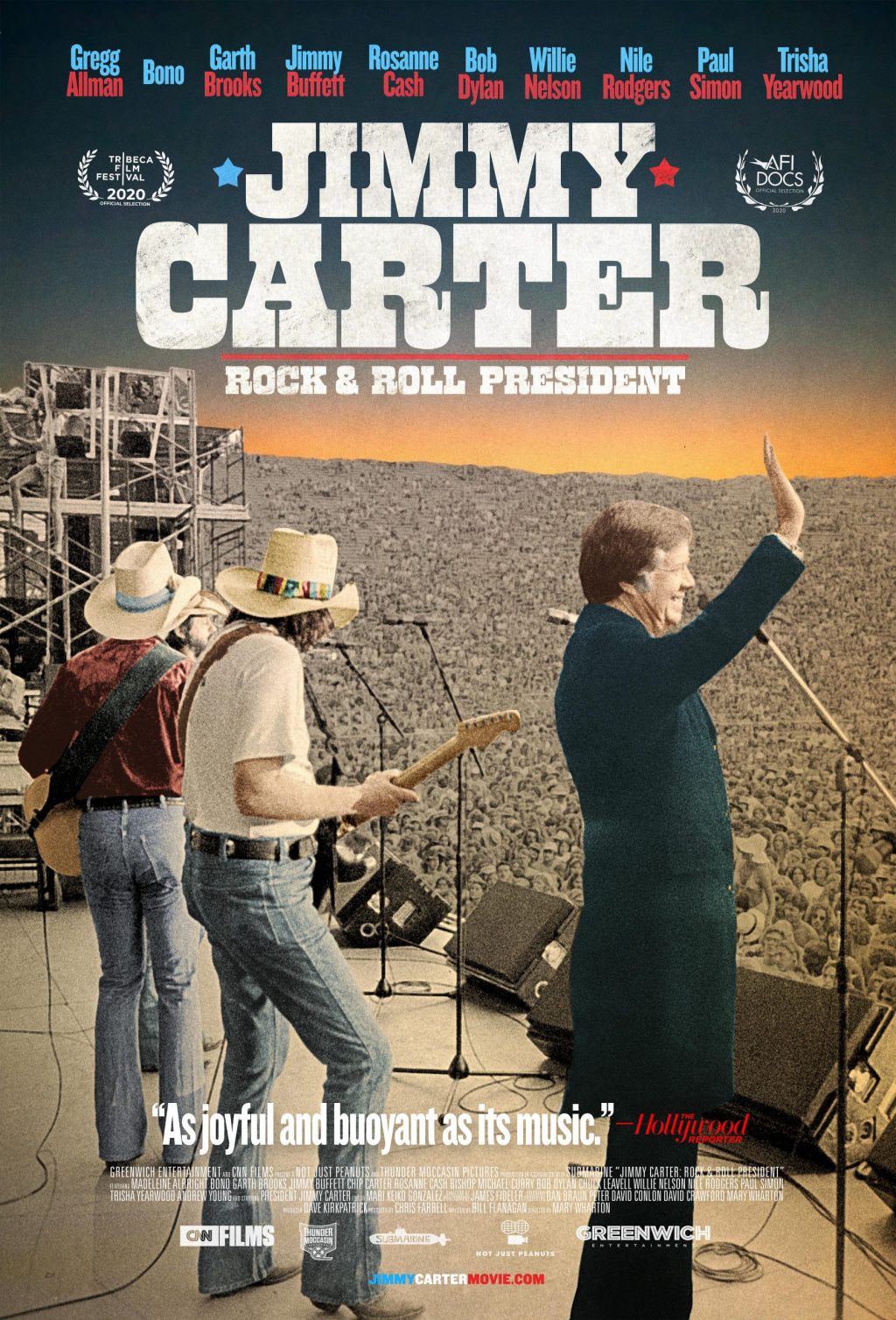
New documentary shows link between President Jimmy Carter and rock & roll music.
Music brings people together. Music heals the soul. Rock & roll music helped Jimmy Carter win the presidential election in 1977. The documentary, Jimmy Carter: Rock & Roll President, shows the former president’s love and appreciation for music. Jimmy Carter incorporated music in his politics to connect with the people. He saw music as an expression of freedom and truth, and a voice that breaks down racial and cultural divides. Nowadays, some musicians no longer consider it a great honor to have the president campaign using their music, unless it’s Ted Nugent or Kid Rock. It’s unknown if President Carter is down with the “Bawitdaba da bang a dang diggy” but he did associate himself with several rock bands, even though it was a political risk at the time.
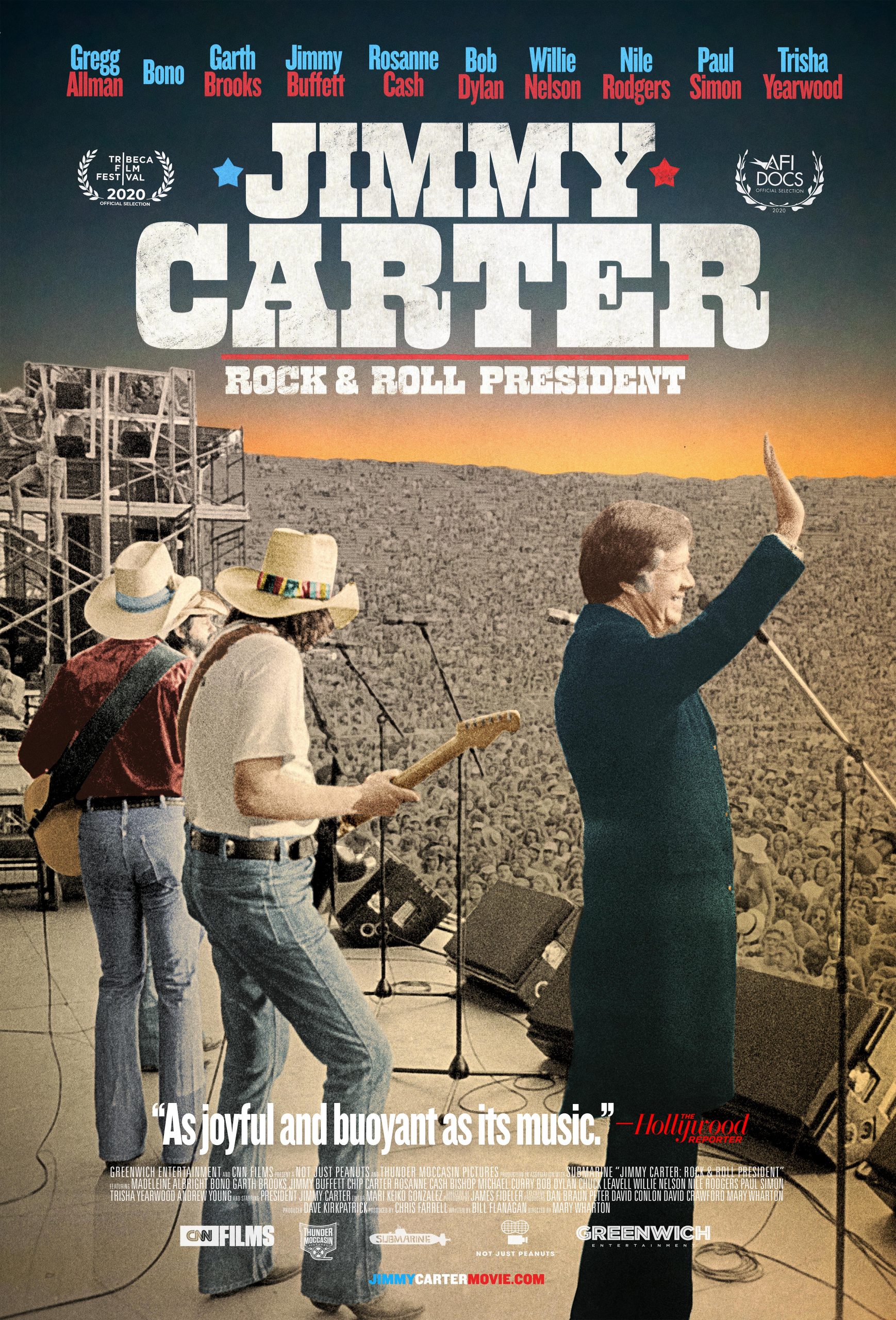

Ode To The Georgia Farmer
Jimmy Carter is a southern gentleman with roots in gospel music. This peanut farmer from Georgia joined the Navy, then became governor, and later the President of the United States. At an early age he understood that music breaks down racial barriers. As governor, he became a leader in the civil rights movement. Carter was the first president to affiliate himself with the rock & roll music scene. Carter’s alliance with rock music and friendships with musicians gave him credibility and new fans, consequently winning him the ’77 election. For instance, bands like Allman Brothers, Charlie Daniels, and Jimmy Buffet took part in his campaigns. Carter was also known for having famous musicians visit him at the White House from time to time, by appointment and unexpectedly.
ALSO READ: Stellar Actor Antony Starr Shines In The Boys On Amazon Prime [Exclusive Interview]
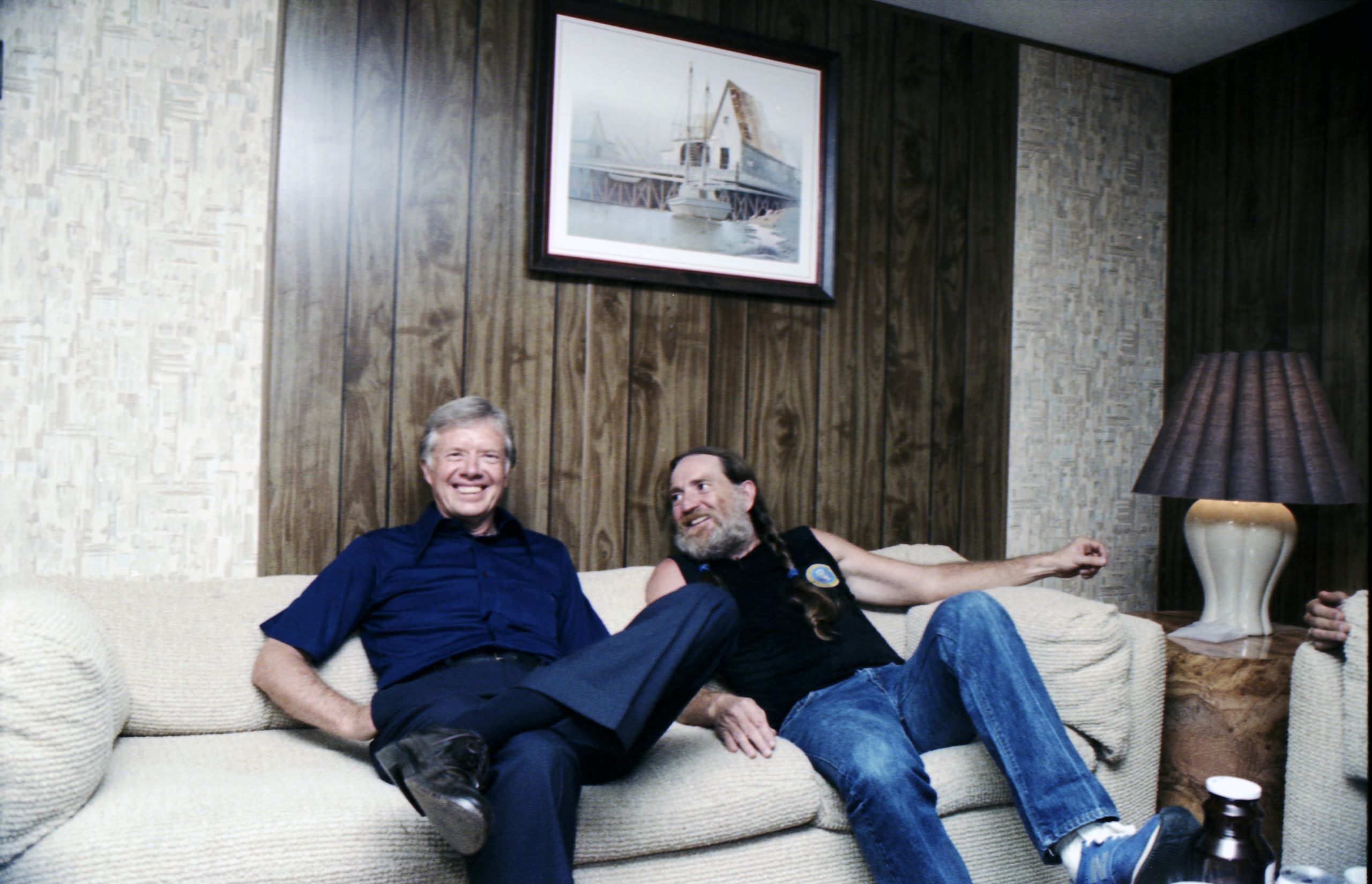
 Jimmy Carter, Willie Nelson at Nelson concert/fundraiser for Carter’s re-election campaign on 9/13/60. Courtesy The Jimmy Carter Presidential Library.
Jimmy Carter, Willie Nelson at Nelson concert/fundraiser for Carter’s re-election campaign on 9/13/60. Courtesy The Jimmy Carter Presidential Library.
Georgia On My Mind
The electric cast of musicians in Jimmy Carter: Rock & Roll President shows how Jimmy Carter and his campaign were plugged into the music scene. This documentary takes an inside look at the former president’s relationship with established musicians and features interviews with rock icons like Gregg Allman, Bob Dylan, Bono, and Willie Nelson. In this film, award-winning director Mary Wharton and first-time producer Chris Farrell give us backstage access to archival footage and show us how rock & roll characterized Jimmy Carter’s cabinet.
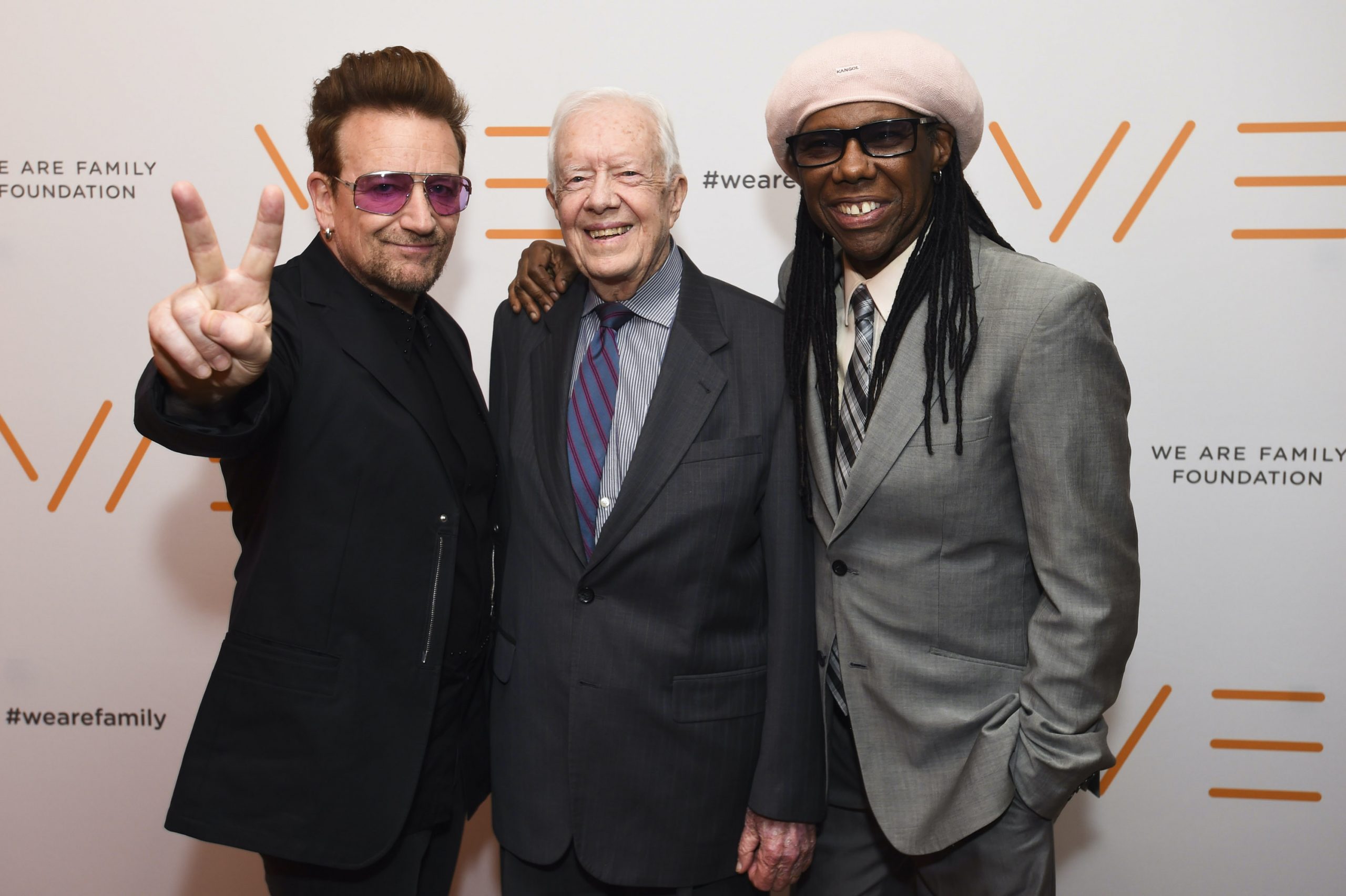
 Singer Bono of U2 attends We Are Family Foundation 2016 Celebration Gala on April 29, 2016 in New York, New York. Courtesy of We Are Family Foundation
Singer Bono of U2 attends We Are Family Foundation 2016 Celebration Gala on April 29, 2016 in New York, New York. Courtesy of We Are Family Foundation
Jimmy Carter: Rock & Roll President comes out in select theaters and virtual cinemas nationwide on September 9th. The release date for home entertainment is October 2nd, the day after Jimmy Carter’s birthday. The documentary is a Not Just Peanuts Productions and Greenwich Entertainment is the distributor. CNN has required the North American broadcast rights.
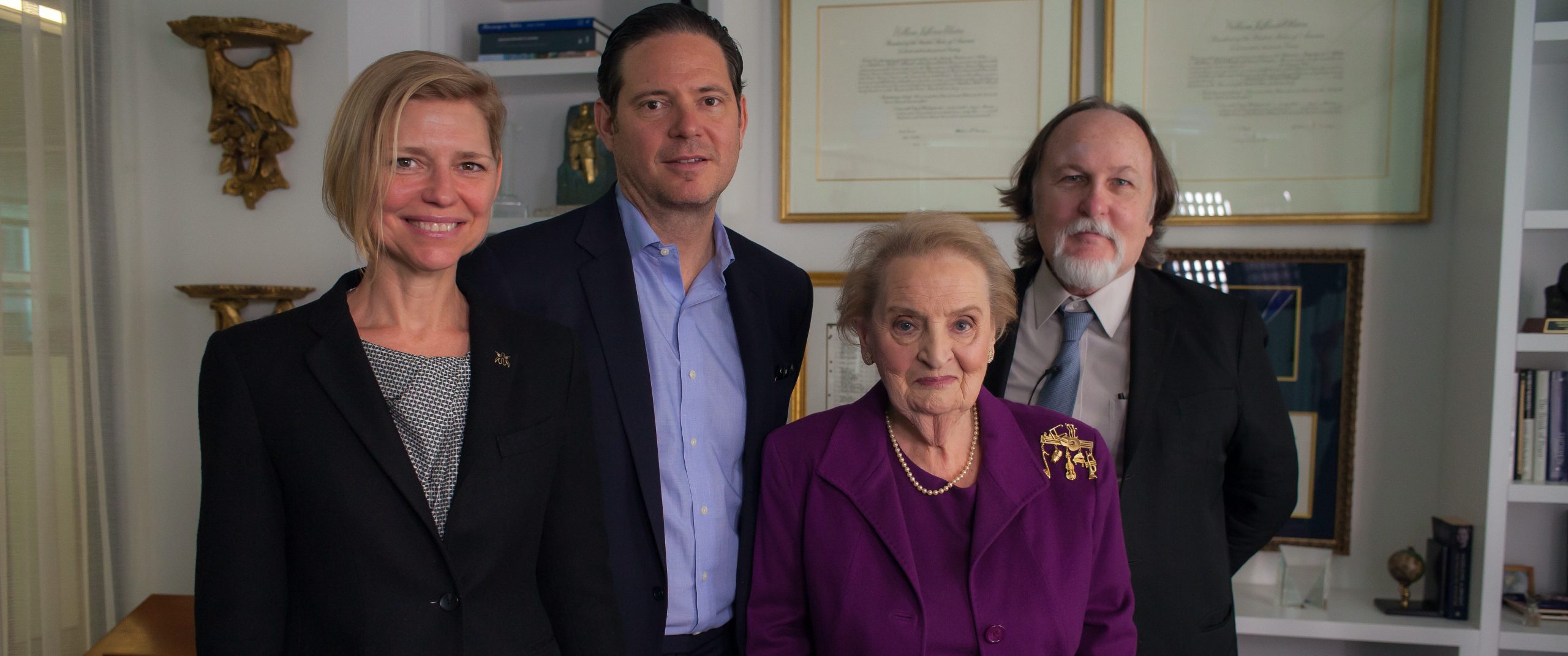

Director Mary Wharton and producer Chris Farrell connected with me via Zoom. During the discussion, the two music aficionados told me how the idea for this documentary originated. They also talked about the process of collecting hundreds of hours archival footage. Mary then shared Jimmy Carter’s favorite segment and his reaction to the film. Finally, I asked if they had any more information about Jimmy Carter’s infamous UFO sighting. For more information on Jimmy Carter: Rock & Roll President visit https://www.jimmycartermovie.com.
Jake Perry: Hi Mary, Hi Chris!
Mary Wharton: Hi!
Chris Farrell: Hey, how are ya?
Jake Perry: Doing well, thanks. Very cool documentary. I’m not into politics at all but I do love rock and roll. And I have to say, Jimmy Carter: Rock & Roll President was very entertaining and I feel like I’ve been missing out on Jimmy Carter. He’s my new favorite president.
Mary Wharton: Right? He’s great.
Jake Perry: This documentary, since it’s music-based, is going to be exposing a lot of people to Jimmy Carter who might not necessarily be into politics. It’s sort of like how the rock and roll bands that supported him during his campaigns were exposing the younger generation to his presidency.
Chris Farrell: Exactly. Exactly.
Mary Wharton: That was sort of the goal.
Jake Perry: Excellent. How did this come about? So, Mary, I know you have a history of making some music programs. I’m guessing Chris is the White House connection? You got the White House clearance over there, Chris?
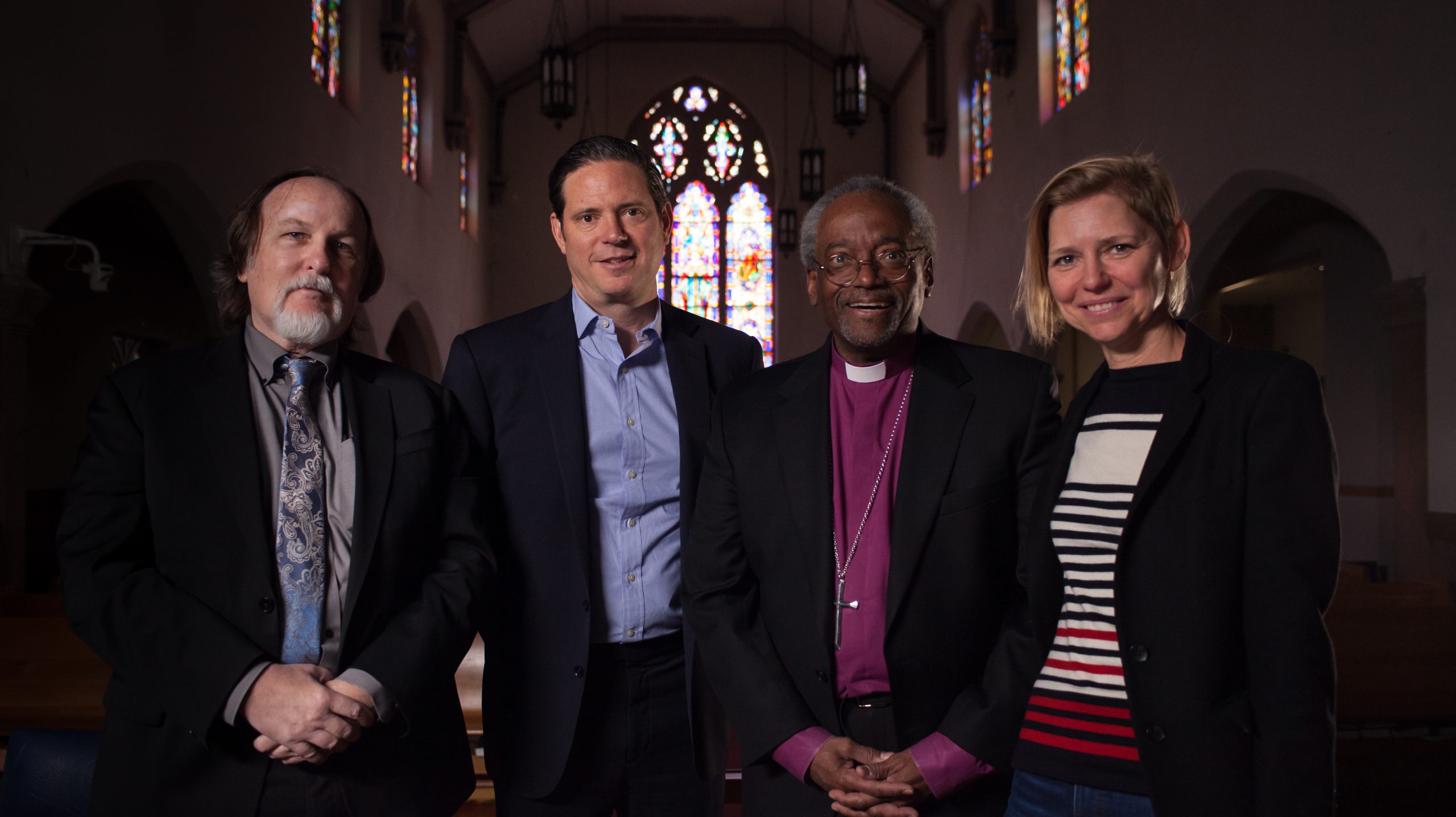
 Photographer / Source Credit: James Fideler / Courtesy Not Just Peanuts LLC
Photographer / Source Credit: James Fideler / Courtesy Not Just Peanuts LLC
Chris Farrell: (laughs) I’ll put it this way. I certainly didn’t know Madeline Albright before this, or John Dalton, or any of these guys. I’m actually a first-time producer. What I would say is that I’m a pretty quick study, I’d like to think. Mary and I have been friends for two decades and for about the last four or five years we had wanted to work on a project. I really wanted to work on a music documentary and specifically to do something with Mary. We had a lot of great ideas. I was just going and going and going. And then I was actually independently working on researching an Allman Brothers documentary and trying to raise financing. And through that, I was introduced to these guys who worked in the Carter White House, who had been held up as people who knew the Allman Brothers, “Hey, the Allman brothers put Carter in the white house, You should go meet with them”. So I went and met with them and they started telling me these stories about that close friendship that Carter had with Greg Allman and how important all the brothers were. I was like, that’s great. Thank you and I get up to leave. And they said, well, do you wanna hear about, and Bob Dylan?” And it’s like, sure, that sounds cool. Tell me about that. And so again, I get up to go and leave and they said, “well, what about Carter and Willie Nelson?” I was like, Jesus, sure. Tell me about that too. And so, I left, I don’t know if it was five minutes later, 30 minutes later, three hours later, but pretty shortly thereafter in my mind, the Allman Brothers idea was gone. This was something that I just knew that there was something there, both the surprising elements of it, but something about music and the intersection with politics. So I called Mary and I said, Mary, I think I’ve found something for us, and then we started going. Clearly, Mary provided the credibility from her history. I think in my case, I was sort of unrelenting with the Carter Center and President Carter and just kept pushing his inner circle and trying to gain credibility.
Jake Perry: Awesome. You both managed to get a lot of great stories.
SEE ALSO: FLETCH: This Hollywood Producer Thinks Jon Hamm Replacing Chevy Chase Is A Big Mistake
Mary Wharton: Chris is an excellent straight man for our little comedy routine. But I think that Chris has a great ability, when we did meet with the folks in Carter’s inner circle, which, obviously this project was well-vetted before we were given the green light. We had to impress upon the gatekeepers of president Carter’s time, that we could take this task seriously and get it done. Obviously that required a lot of diplomacy on Chris’s part and that that was his child by fire as a first time producer and he pulled it off.
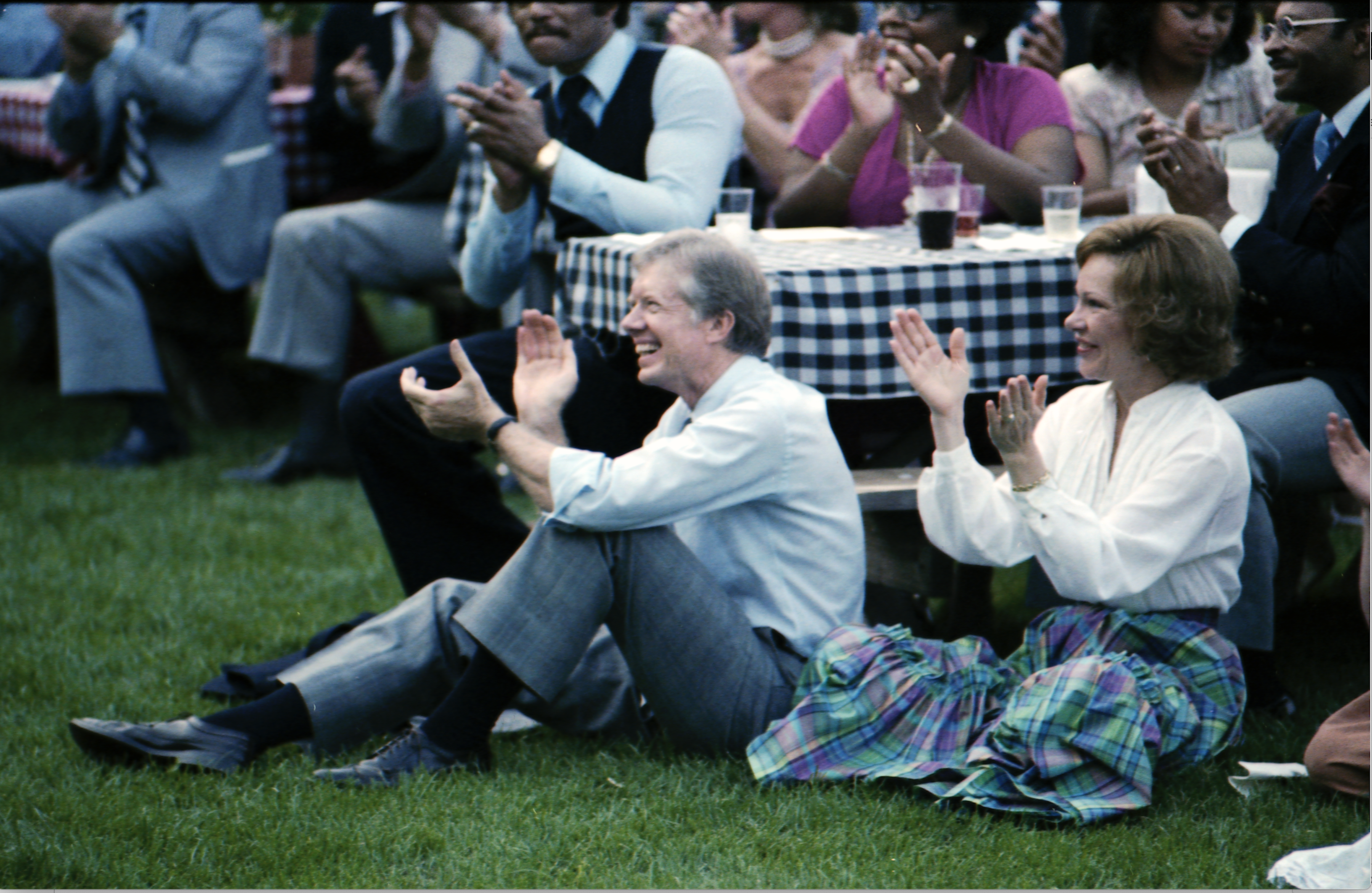
 Jimmy Carter + Rosalynn Carter enjoying a concert on the White House Lawn on 6/7/1979. Courtesy The Jimmy Carter Presidential Library
Jimmy Carter + Rosalynn Carter enjoying a concert on the White House Lawn on 6/7/1979. Courtesy The Jimmy Carter Presidential Library
Jake Perry: Yes, they might look at your resume Mary and see a Phish documentary on there. It might raise a couple of red flags. They’ll be like, alright, we don’t trust her!
Mary Wharton: (Laughs) They might.
Jake Perry: This documentary really takes you back. There’s a lot of nostalgic footage. How did you two go and find all this great footage? Is it public access footage or did you have you get it from some of the former administration?
Mary Wharton: A great deal of the footage came from the Jimmy Carter presidential library, which is all public domain footage that was shot by White House cameras. And a lot of the beautiful film footage of the concerts at the white house and other stuff like that came from there. But we also had to supplement it with a lot of different sources from the television news archives to archives that specialize in music footage. We had to deal with the Norwegians to get footage from the Nobel peace prize ceremony. It sort of came from all kinds of different places. It was a real challenge to sift through all of the footage that was out there about President Carter. I’ve never had a project that we acquired so many different materials to work from and just keeping track of it all was a Herculean task. I was very lucky to have a very capable young lady that was my right-hand woman and we would have been lost without her. We had thousands of photographs and hundreds, I think something like 800 hours of footage that we loaded into our project. It was a lot of stuff. Carter’s probably one of the more documented men on the planet so sifting through it all and finding the right pieces to tell the story was quite a thing.
Jake Perry: Were there any stories that were off-limits when making this documentary? Because I heard that Willie Nelson smoked marijuana in the white house and I know everyone’s heard that story. But then it was nice to hear from his son and have the behind the scenes look on that, but was there anything that was off-limits for you?
Mary Wharton: No. I mean, there was nothing that we were told not to talk about. For us, we set our own kind of parameters for what we want. There were things that we would have liked to talk about. We made this kind of rule for the film that we were making a music documentary and if we couldn’t find some kind of musical connection to the story that we were telling then we weren’t going to tell it. Like for example, we would have liked to point to the fact that Carter put solar panels on the White House and created the energy department and did a lot to sort of acknowledge the existence of climate change and encourage Americans to do something about it. But we couldn’t find a musical connection to that and so we left it out.
ALSO READ: Text, Drugs, And Rock ‘N’ Roll: Director Scott Crawford Captures The Spirit Of CREEM Magazine [Exclusive Interview]
Chris Farrell: And to your point, remember Mary, initially, there was this idea that like, we would put a pitch, this is a suggestion that came to us, from one of the Carter people, why don’t you put a page in like all the accomplishments of President Carter? And by the way, it’s not the dumbest idea of the world because there are a lot of accomplishments and much more than people think. But to your point earlier about politics versus rock and roll, we were making a music documentary. We weren’t making a political film. Now we use music, and Mary talks about this a lot, we use music in the form that she’s very used to, to convey messages and to, sprinkle things about Carter and to make sure people know that he actually was a good president and tried to do things and was an amazing human being, but as she said we tried to stick to that discipline.
Jake Perry: Okay. I’ve heard of Elvis showing up at the White House talking to Nixon. Now Carter goes in there, it’s times ten! He’s hanging out with Willie Nelson, Allman brothers, Cher and then, Crosby Stills, Nash & Young are showing up unexpectedly and knocking on the door at the White House.
Mary Wharton: Yeah, that was a funny story. And I think it’s interesting because like the way that Jimmy Buffett describes going to the White House as being kind of like the gypsies let loose in the palace and that they were just kind of welcomed in and how funny that was. And when you see the photos of Willie Nelson sitting in the oval office with his scraggly long hair and his rock and roll t-shirt with the sleeves cut off, and on crutches, because he had just been released from a Jamaican prison, it was definitely almost like a breath of fresh air flowing through Washington DC in that moment.
Jake Perry: There were a lot of musicians in the film. Forming an alliance with rock and roll music gave Jimmy Carter credibility. And at the same time, Jimmy Carter gave Bob Dylan a personal credibility because now Bob Dylan is thinking, wow, I’m actually reaching the president of the United States with my music.
Mary Wharton: Yeah.
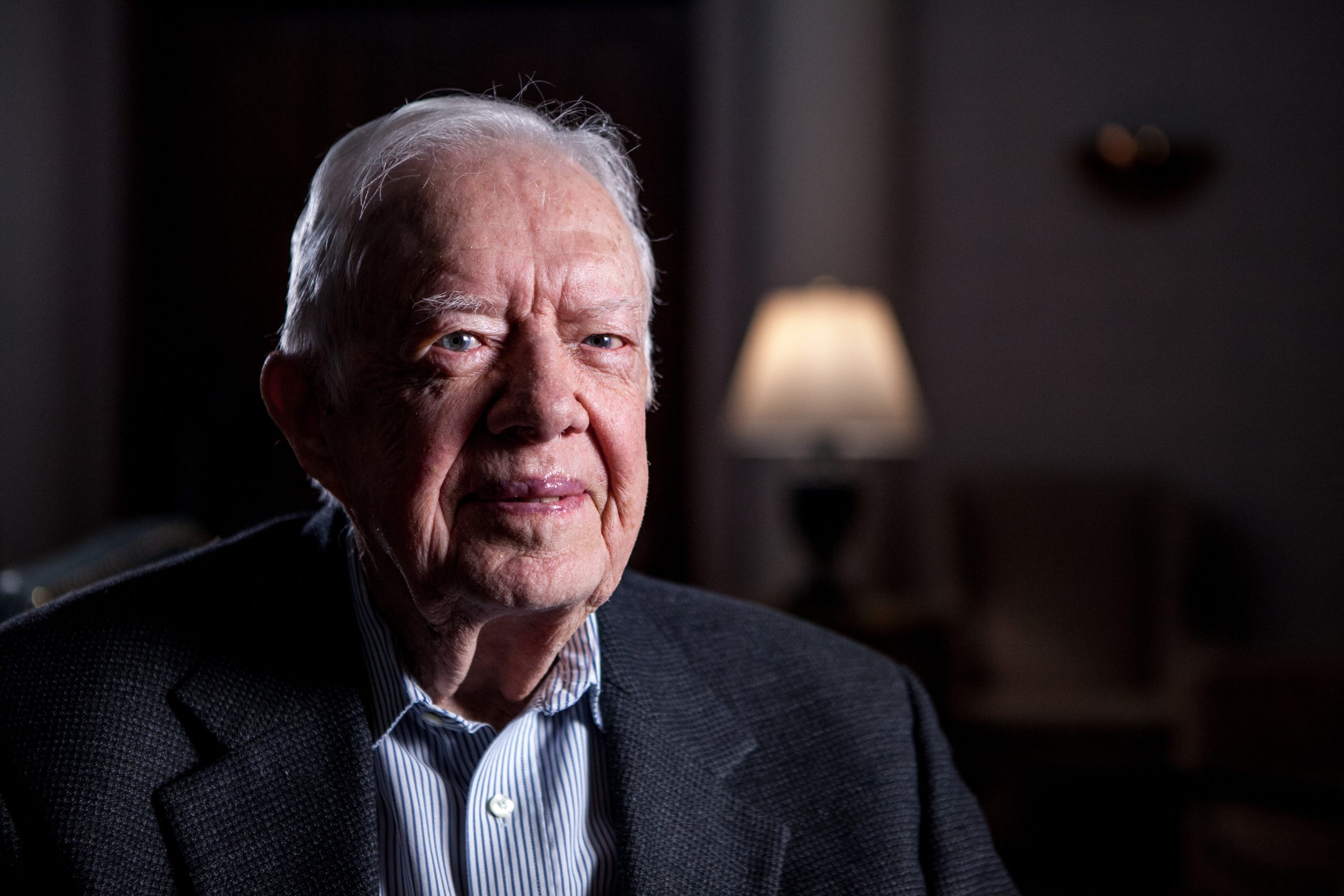
 Jimmy Carter, BTS Rock & Roll President film shoot, at The Carter Center, Atlanta, Georgia on 2/15/2018. Courtesy of James Fideler / Courtesy Not Just Peanuts LLC
Jimmy Carter, BTS Rock & Roll President film shoot, at The Carter Center, Atlanta, Georgia on 2/15/2018. Courtesy of James Fideler / Courtesy Not Just Peanuts LLC
Jake Perry: Did Jimmy Carter have a favorite part of this documentary?
Mary Wharton: He has seen it a couple of times. Jimmy is a very emotional guy, which is interesting because he doesn’t really come across that way. He can be very stern in a lot of ways, but at the same time, his heart is very much on his sleeve. He’s very in touch with his emotions. And I think that that was something that Madeleine Albright told us about. I don’t think we use this in the film, but she talks about him getting flack for being kind of too emotional sometimes. And so he’s tried to be more stern and more serious, but he did get very emotional when he watched the documentary. One point when I noticed that he was especially affected by, when there’s a moment when we sort of give a little bit of shine to Mrs. Carter, to Rosalynn and talk about her impact on him. And there’s a clip, an archival clip, where he’s sort of acknowledging all of the people that have helped him in his work at the Carter Center. He’s sort of just learned that he’d been awarded the Nobel Peace Prize and he says something about, Mrs. Carter, that she’s been a partner in everything that he’s ever done. And in the news clip that we use in the film he is getting so emotional that he can’t even quite say her name without tears coming to his eyes. I looked over at him when he was watching the film and when that clip came on and he saw himself get emotional in that archival moment, he started to cry at that just watching that. I think my heart just grew a couple sizes bigger seeing him react that way to the film. So I don’t know if that was his favorite moment, but it was definitely a moment that he reacted to.
Jake Perry: Wow, mission accomplished.
Chris Farrell: Well, it’s funny because he definitely is, as Mary said, he could be very stern, and we saw some signs of that. It was mainly more urban legend or lure. It was always told to us, “be careful, be careful: but he was always fantastic with us every time we were with him, It truly was one of the highlights of the whole project, when Mary and I went down there (Georgia) in January and showed it to him and his family. And as she said, there were times he was very emotional. There are times that he was smiling and laughing. Amy Carter, who people never hear about, she was behind us and she was laughing her head off. She actually texted later to let us know that he said that he always, by the way, we can tell you a lot of stories about this, but we won’t tonight. He always can find something, because there’s always something, no matter how good a job you can do. Like during the contract negotiations, he was correcting my grammar. But he told Amy and it came back to us, that he loved it. He would not have changed a thing. What an incredible compliment to get. Someone who actually lived, this is his life, and he was very well pleased with the outcome.
Jake Perry: That’s good to hear. Congratulations to you both, this is a great documentary. I’m a big conspiracy theory guy, I love UFOs and paranormal stuff. I didn’t really know too much about Jimmy Carter before this documentary. I did know he was the one president that claimed he saw a UFO. Now for my last question, did you two find anything out about that when you were doing your research?
Mary Wharton: (Laughs) I didn’t actually didn’t investigate that. I think if Jimmy Carter said he saw a UFO, he probably saw a UFO. He’s not a man that is comfortable with telling lies.
Jake Perry: Yeah. He said he was going to encourage the government to release the information but he backed away after his election. He said there was defense implications or something, I guess there’s more to that. That’s a whole other documentary right there.
Chris Farrell: (Laughs) Stay tuned For the sequel.
Jake Perry: Thanks so much for taking the time out of your day to talk to me. The documentary is great. I learned a lot about Jimmy Carter and his connection with the music scene. And also what a nice guy he is, he didn’t drop one bomb. He won a Nobel peace prize after his presidency and he seems like a down to earth guy. He’s not living in a $15 million mansion in Martha’s Vineyard or fancy compound somewhere; he’s back home in Plains, Georgia on the peanut farm, still listening to his records. Alright, thank you so much for your time. Take care.
Chris Farrell: Thank you, have a great evening
Mary Wharton: Absolutely, thanks.
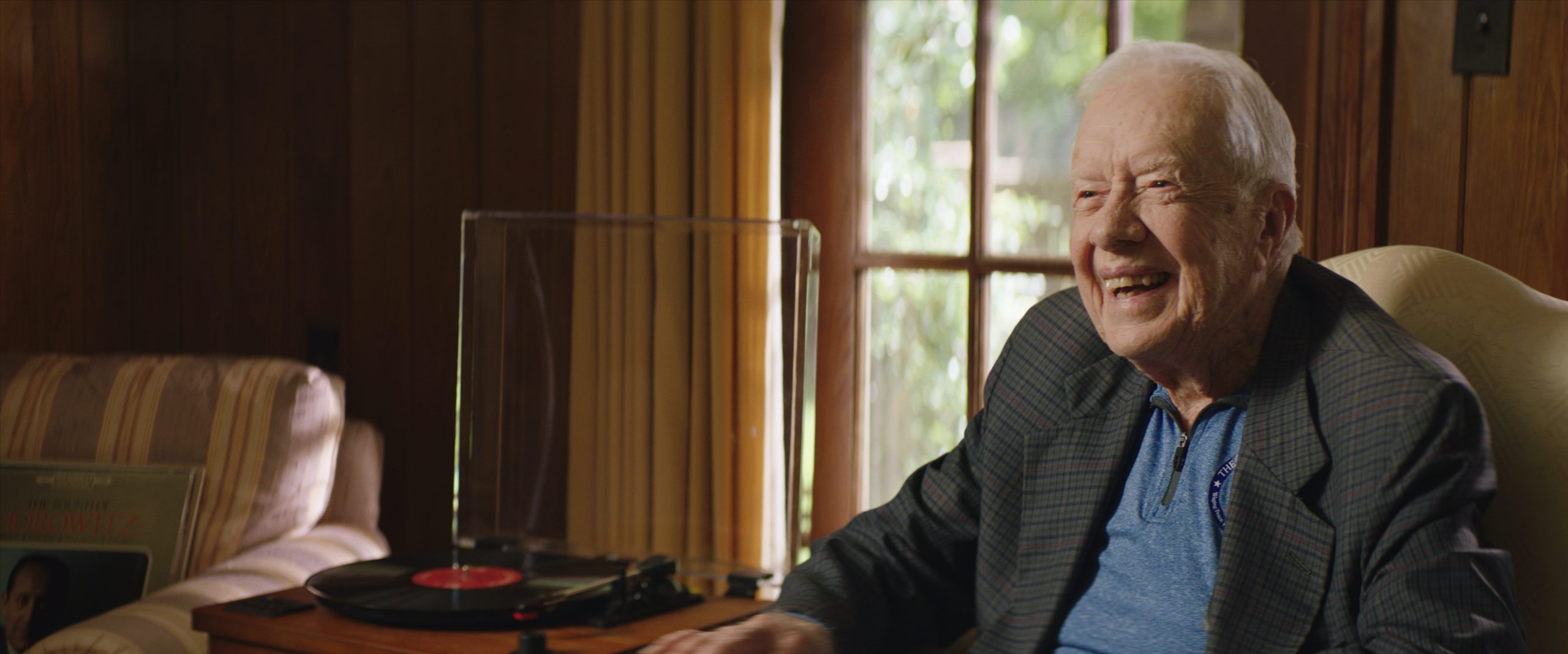

Does Jimmy Carter: Rock & Roll President have your vote?
Continue the LRM Online conversation on Discord by CLICKING HERE!
—–
Have you checked out LRM Online’s official podcast feed yet The LRM Online Podcast Network? This includes our flagship podcast Breaking Geek Radio: The Podcast, GeekScholars Movie News, and our morning show LRMornings. Check it out by listening below. It’s also available on all your favorite podcast apps!
Subscribe on: Apple Podcasts | Spotify | SoundCloud | Stitcher | Google Play